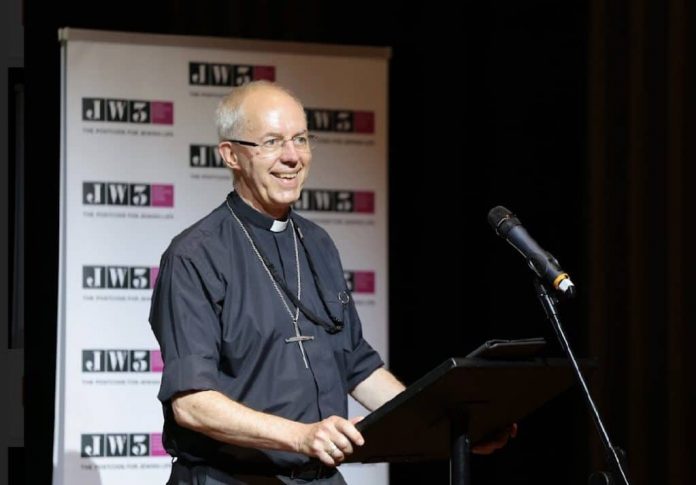The news that an ancient and beautiful cathedral in Peterborough has announced that it may go broke and have to close because it can no longer pay its bills has shocked the Anglican world. It came shortly after the day that Justin Welby’s formal resignation as Archbishop of Canterbury took effect.
Several commentators linked the two announcements; the imminent closure of the first Anglican cathedral to go bust inevitably became something of a backdrop to a variety of attempts to assess the record of the former archbishop in office.
Canon George Conger has been an observer of all things Anglican, both on this side of the Atlantic during his spell at Oxford University as a research student, and from the other side as an eminent Episcopalian clergyman and writer.
He has become one of the best known clergy-journalists in the Anglican Communion. This week he was a guest on a podcast Merely Catholic and offered his own reflections on the way in which Archbishop Welby had performed.
They come from the vantage point of a commentator who has known most of the Anglican archbishops over the last 30 years, and all of the Primates in the Anglican Communion as a respected commentator and interpreter of Anglican affairs.
At the beginning of the interview I asked Canon Conger for his reaction to my own assessment: in a recently published piece I had asked the question whether or not Mr Welby was the worst archbishop since the Reformation.
I wondered if Canon Conger would take me to task and invite me to or to reassess my judgement, tempering it with more mercy. Instead he replied, at about seven minutes in: “No. You were too kind.”
It wasn’t just that in the worst-archbishop stakes the top (or bottom) place until recently had been held by an archbishop under Charles I: George Abbot, who in 1621 shot and killed his gamekeeper while out hunting.
“There is Justin Welby the man,“ Canon Conger said. “Then there’s Justin Welby the person in the office. If you take a critical look at the things he accomplished domestically, internationally, nationally, in the political realm as a member of the House of Lords, he was a failure.“
Used as we are to the English practice of under-statement, Canon Conger’s assessment is stronger than one might expect. He is not alone, however. Cathy Newman, a fellow journalist, has just been named “Woman of the Year” by the Women in Journalism organisation. Her accolade reads: “Newman’s relentless seven-year investigation into the Church of England’s abuse scandal spanned three continents and culminated the resignation of the Archbishop of Canterbury.”
“If you look at the deeper picture of what he represented and what he said“, Canon Conger insisted, “he was destructive in a way that we’ve not seen since the Reformation.” He suggested one way of arriving at this judgement might be to trace the decline in clergy morale in the last 15 years.
Under Mr Welby’s hyper-managerial style, clergy found themselves deluged by burdens of administration that had little to do with their pastoral calling, and threatened its survival. Additionally, the institutional commitment to net zero which he oversaw and encouraged condemned the elderly in countless parishes to endure the cold during the winter if they attended liturgies, as they were deprived of the capacity to renew and repair their church boilers.
Canon Conger pointed out that the balance between administrators and clergy in some dioceses had shifted drastically away from parish clergy and towards admin support staff. “In the Diocese of Truro“, he observed, “the 31 stipendiary clergy are almost outnumbered by 26 diocesan staffers. There are almost as many people [working as] environmental officers, women officers, ecumenical officers, gay and lesbian officers, net zero officers ad infinitum drones.”
“I have a friend who is a warden in a parish of the diocese of Exeter,“ he went on. “He and his wife have two children in their youth group: his children. His wife, who is the youth group leader, is being made to take all these courses and file all these reports … half of her time as a volunteer youth leader is filling out forms for safeguarding for her own children.”
During Mr Welby’s tenure a desperate new campaign group emerged, called “Save the Parish“. This turned out to be a plea not to save the parish from the state or the country but to save the parish from Mr Welby’s bureaucratic managerialism. The eminent and distinguished spokespeople who rallied to this movement were protesting against the priorities of a managerially minded institution which were a danger, not a support, to parish life.
Canon Conger had been an assiduous observer of the Anglican Communion, the 42 autonomous provinces across the world where once the British Empire held sway. He has attended its meetings as an observer and reporter, while it has been riven by disagreement over the issue of homosexuality in particular. The pro-gay agenda has been ruthlessly pushed by the Church of England and the Episcopal Church in the USA. But patience among the conservatives elsewhere has snapped. When asked what state the Communion was in at the end of Mr Welby’s tenure, he said: “It’s over.”
“Those national churches that represent the bulk of the people in the pews on Sunday have washed their hands of the Church of England in the person of Justin Welby,” he said. “With Justin Welby there arose a degree of animosity that was unprecedented. Money would be used to threaten some of the poorer African provinces to change their voting patterns towards the progressive agenda, which was increasingly resented.”
Canon Conger lamented that the archbishop had lacked both the appearance of spirituality and a judgement that could be relied on. He gave as an example Mr Welby’s patronage of the latterly-disgraced Paula Vennells for the post of Bishop of London. It might be argued, following the subsequent Post Office scandal, that the diocese had a lucky escape.
His performance in the House of Lords, meanwhile, had led to the impression that the episcopate represented the “Guardian editorial writers at prayer”. The country had been offered an unremitting diet of Socialism instead of Christianity when so many people were, in fact, still hungry for the Word of God.



